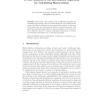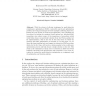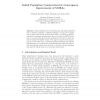20 search results - page 2 / 4 » emo 2005 |
137
click to vote
EMO
2005
Springer
15 years 8 months ago
2005
Springer
Abstract. The hypervolume measure is one of the most frequently applied measures for comparing the results of evolutionary multiobjective optimization algorithms (EMOA). The idea t...
118
click to vote
EMO
2005
Springer
15 years 8 months ago
2005
Springer
We present a new analysis of the LebMeasure algorithm for calculating hypervolume. We prove that although it is polynomial in the number of points, LebMeasure is exponential in the...
112
click to vote
PREMI
2005
Springer
15 years 8 months ago
2005
Springer
With the advent of efficient techniques for multi-objective evolutionary optimization (EMO), real-world search and optimization problems are being increasingly solved for mulitple ...
EMO
2005
Springer
15 years 8 months ago
2005
Springer
Abstract. Multi-objective evolutionary algorithms (MOEAs) have proven to be a powerful tool for global optimization purposes of deterministic problem functions. Yet, in many real-w...
112
Voted
EMO
2005
Springer
15 years 8 months ago
2005
Springer
Nearly all Multi-Objective Evolutionary Algorithms (MOEA) rely on random generation of initial population. In large and complex search spaces, this random method often leads to an ...



